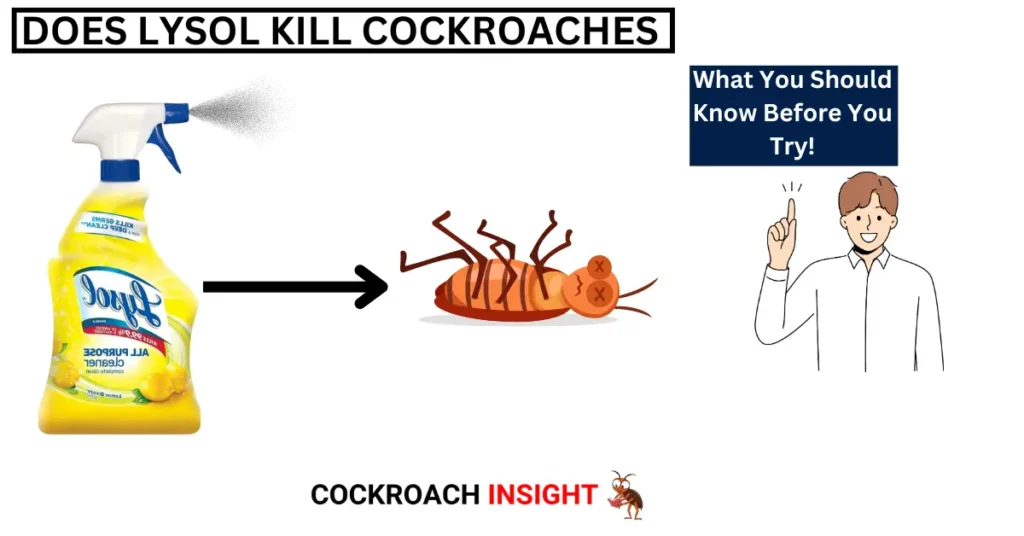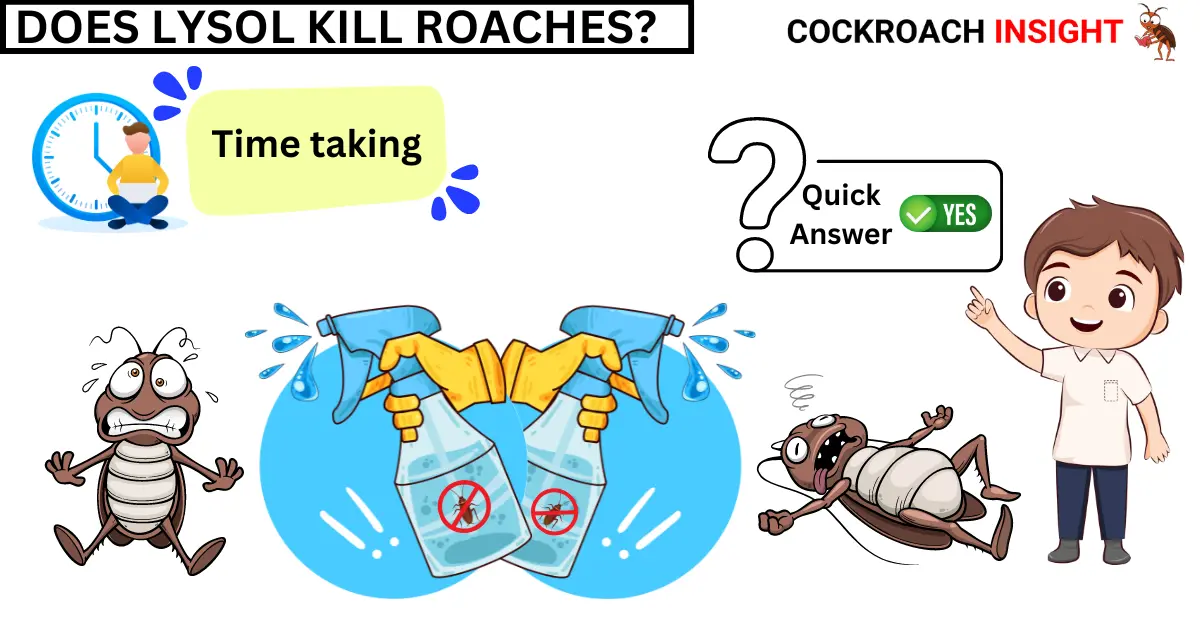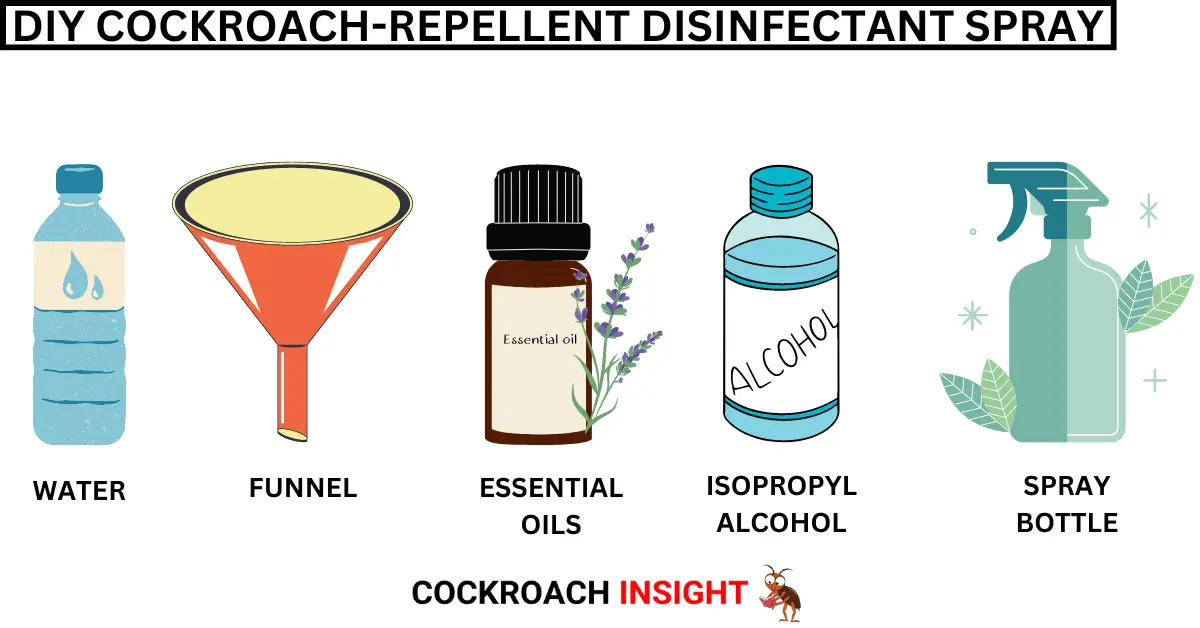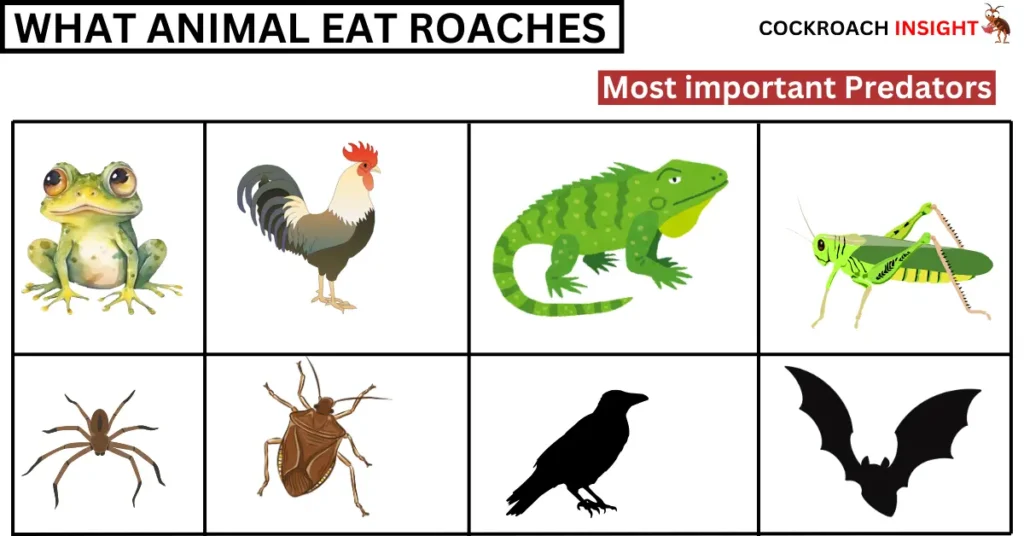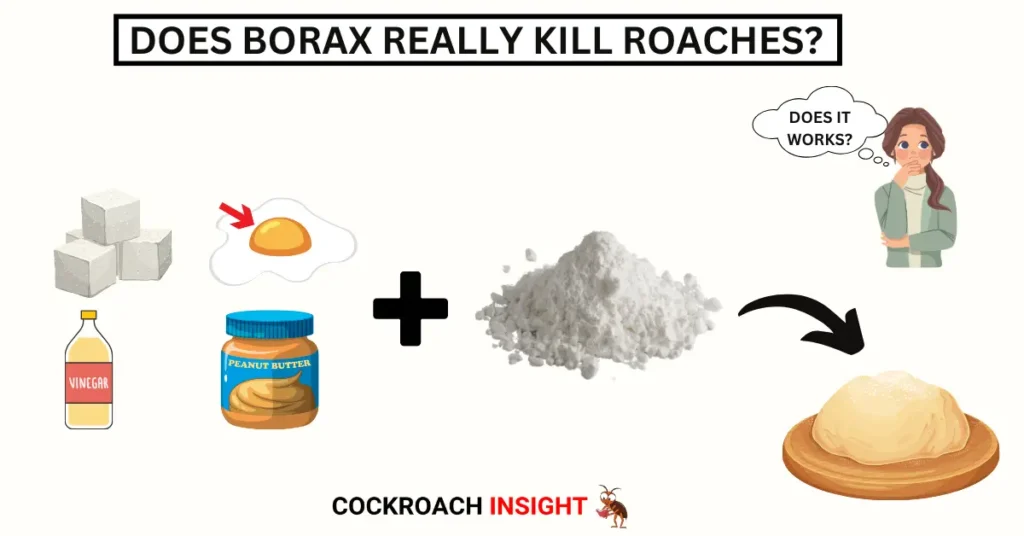Cockroaches are commonly known to infest homes and create difficulties for homeowners. They are tough and quick and often require immediate action to prevent an infestation.
One of the many household products that people usually rely on is Lysol, a potent disinfectant and cleaner. But the question remains: Does Lysol kill roaches?
Lysol is widely used to sanitize surfaces, kill germs, and keep homes smelling fresh. Given its potent chemical makeup, it’s understandable why someone might reach for a can of Lysol in desperation when they spot a cockroach.
Using a common household product to kill pests seems convenient, but the effectiveness of Lysol against roaches is not as straightforward as it may seem.
This guide will provide a detailed explanation of whether or not Lysol is effective at killing these insects, how Lysol works, and whether it is a long-term investment against these pests using Lysol. The scientific truth about Lysol’s effects on roaches, its limitations and potential dangers, and, most importantly, a comprehensive roadmap to truly effective, safe, and lasting roach eradication. Stop wasting time and resources on temporary fixes and empower yourself with proven strategies to reclaim your home from roaches.
Does Lysol Kill Roaches? The Quick Answer
Yes, Lysol can kill a roach, but only if it is sprayed directly on the insect. Lysol causes suffocation by invading the roach’s exoskeleton shell, enter their nervous system and eventually draining the moisture in their bodies.
However, while Lysol can kill a roach, it is still not the most efficient or dependable means, especially when it comes to solving wider infestations.
When sprayed on the targeted area, Lysol pesticides intoxicate the cockroaches through breathing holes called spiracles.
This method sometimes takes from a few minutes to hours to effect the intended final result, which is to kill the cockroach.
Moreover, Lysol can kill roaches, but that is as far as it goes; there are no effects on the later invasion of other cockroaches inside the residence.
Sealing entry points and using appropriate cockroach baits are also effective ways to offer further and consistent measures for pest management.
You can read more about surprising cockroach hiding places here, which will assist you in locating places that Lysol by itself may not reach.
How Lysol Works on Roaches
Lysol can easily target a cockroach’s respiratory system and its exoskeleton. Thus, when you directly gulp Lysol into a roach, a coating of the disinfectant upon the body of the insect closes its spiracles until there is no more oxygen for the cockroach to breathe.
Eventually, the roach runs out of oxygen, and the remains of its body begin shutting down in a process referred to as suffocation. Additionally, Lysol kills roaches by disrupting their oily exoskeleton, which leads to dehydration.
However, while Lysol can kill cockroaches on contact, it is also crucial to stress that this approach is not sufficient with a single spray, as too many sprays are needed.
Unlike professional pest control products designed specifically for roaches, Lysol is not a residual product, which means it will not continue to work after it has dried up.
For instance, roaches typically seek places you never imagined even the tiniest cockroach would seek: a crack, a crevice, deep behind the cabinets and under the appliances.
If you want to solve the cockroach infestation problem, you will have to take care of these entry points by sealing them.
For more tips on keeping roaches out, check out this guide on sealing cracks to prevent cockroach infestations here.
DIY Cockroach-Repellent Disinfectant Spray
What You’ll Need
- 1 cup of distilled water
- 1 cup of rubbing alcohol (70% concentration is good, but 90% is even better)
- ½ cup of white vinegar (optional for extra cleaning power)
- 20-30 drops of essential oils (peppermint, eucalyptus, or tea tree oil)
- Some drops of dish soap (optional for better cleaning)
Steps
Mix the water and alcohol: Pour the water and alcohol into a spray bottle, using equal amounts of both.
Add vinegar: If you want extra cleaning power, add the white vinegar to the mix.
Add essential oils: Put in 20-30 drops of peppermint, eucalyptus, or tea tree oil. These oils are known to repel cockroaches.
Add dish soap: Some drops of dish soap will help the spray stick to surfaces and can suffocate cockroaches if they come into contact with it.
Shake well: Close the bottle and shake it to mix everything.
How to Use
- Spray the solution around areas where you’ve seen cockroaches, especially around cracks, crevices, and entry points.
- You can also use it on countertops, under sinks, and other areas where cockroaches might travel.
- Wash your hand after using it.
- This mixture not only disinfects but also naturally repels cockroaches. It won’t kill them instantly, but it will make your home less appealing to them.
When Lysol Might Work – And When It Won’t
Yes, a roach can be killed using Lysol directly on the insect, but its range of effectiveness is limited depending on certain conditions. Here’s when Lysol might work—and when it won’t.
When Lysol Works
Direct Contact
It needs to come into contact with the roach, and Lysol does the job. The chemicals in Lysol choke and dry out the insect, making it impossible for it to breathe, causing it to die at last.
If you see a roach running through the kitchen, then you spray it with Lysol. It will definitely kill the roach, but always within a few minutes or less.
Small, Isolated Incidents
If Finding only one roach or a couple of them, Lysol is fantastic for utilizing rapidly and can make sure they disappear. Not surprisingly, it’ll go on temporarily.
But it would not cover all aspects of larger infestations. However, it would not eliminate larger infestations.
When Lysol Fails
Infestations
If you’re dealing with a larger infestation, Lysol will not kill cockroaches quickly, nor will you be able to avoid future purchase of cockroaches in your home. In that case professional pest control or heavier products are needed.
Nests and Eggs
Nests and Eggs
Lysol kills on contact but cannot penetrate egg casings (oothecae) or reach hidden nymphs. So, Lysol will not eradicate cockroach nests or eggs; therefore, infestation quickly rebounds even after visible roaches are gone.
Hidden Roaches
Roaches often hide in cracks, behind appliances, or within walls, making it difficult to spray them directly. In these cases, Lysol won’t be effective because it doesn’t have a residual effect or the ability to reach hidden areas.
Larger infestations will require something more systemic, such as roach bait stations or professional pest control services.
Sometimes, fumigation might be needed to deal with an infestation that has gotten out of control. You can learn more about fumigation for cockroach-free homes here.
Myth vs. Fact: Does Lysol Attract Roaches?
Myth: Some believe Lysol attracts more roaches or causes them to reproduce faster.
Fact: Lysol does not attract cockroaches. However, when ineffective sprays stress roaches, they can scatter, hide in new areas, and potentially spread the infestation. This makes the problem appear worse, not better.
Safety Concerns of Using Lysol for Roach Control
Though Lysol can kill cockroaches, there are some issues with its use, most especially the adverse effects that can arise from excessive use of the product or even using it in inappropriate places, such as the kitchen or around kids and pets.
Health Risks to Humans
It contains active ingredients that are harmful to human health, such as ethanol and quaternary ammonium compounds that can make one very sick when inhaled in considerable quantities.
Extending the use of Lysol in enclosed places whose ventilation is poor can create health hazards such as respiratory problems or skin irritation.
When using it on roaches, it is advisable not to spray it in the kitchen or places where people prepare food due to potential health risks because chemicals can cause health risks.
Impact on Pets
Lysol can be toxic to pets, particularly cats, as their livers are less efficient at processing certain chemicals found in household cleaners.
However, when using Lysol to get rid of roaches in areas accessible by your animal friends, you should be careful where and how the product is applied.
Do not allow pets near spray areas until the surfaces are dry, which will prevent accidental ingestion or contact with the wet product.
Environmental Concerns
Safety issues also include the use of chemical sprays like Lysol as well, which has a direct environmental impact.
Overusing it can lead to indoor air pollution and tossing the empty Lysol cans away contributes to environmental damage.
If you are looking for more environmentally friendly options, think about IGRs (Insect Growth Regulators) which last longer and are much less toxic.
For more details on maintaining a cockroach-free home while prioritizing safety, check out this guide on how cold temperatures affect cockroaches here.
Is Lysol the Best Solution? Pros and Cons
PROS
- It can kill roaches when sprayed directly. The active ingredients break down a roach’s exoskeleton, leading to death on contact.
- Lysol is a common household product, making it easy to access when dealing with an unexpected roach problem.
- It disinfects surfaces while killing roaches, helping to remove harmful germs and bacteria that cockroaches may carry into your home.
- It helps clean up areas where roaches have left trails, droppings, or germs, ensuring a cleaner and more hygienic environment.
- Lysol disrupts the protective oily layer on a roach’s exoskeleton, leading to dehydration and eventual death, though this is more useful for small-scale infestations.
CONS
- Lysol is not specifically designed to kill pests, which makes it less effective compared to specialized roach-killing products.
- It must be sprayed directly onto the roach, which is often difficult as roaches tend to hide or move quickly.
- Once Lysol dries, it no longer kills roaches and offers no long-term protection or residual effect, unlike professional roach sprays.
- Overuse in kitchens or areas with children and pets may pose health risks, such as respiratory irritation or chemical exposure.
- Lysol is not effective for treating infestations. It only kills on contact and doesn’t target nests or eggs, so it’s not a solution for large-scale problems.
- In many cases, it may take multiple sprays to kill a single roach, which can be time-consuming and impractical for dealing with several pests.
More Effective Alternatives to Lysol for Roach Control
Even though Lysol may kill the roach, it is not the right product to fight the cockroach infestation in the long term. Here are some more effective alternatives to Lysol’s on the market that yield faster results and prevent heavier infestations:
Roach Bait Stations
The best way to deal with them is by using cockroach roach bait stations, which contain food that is laced with poison.
When the roaches eat the bait, they take it back to their nests, which spreads the poison to other roaches. This method is more effective than Lysol — It focuses on the colonies rather than the single roaches you see.
IGRs — Insect Growth Regulators
IGRs) are chemicals that disrupt the reproduction and normal growth of cockroaches. While not roach killers on the spot, these deter immature roaches from maturing to adulthood while they are low in population.
IGRs can assist in the complete removal of an infestation after some time, unlike Lysol, which will only kill upon contact. Learn more about keeping German roaches away with these solutions here.
Other DIY ingredients and techniques also available to eliminate roaches like Boric Acid Diatomaceous Earth (DE), sticky traps and Vacuumed Cleaning but with limitations.
Preventive Measures:
Sanitation is the Key:
Recommendations below are based on Integrated Pest Management (IPM) principles endorsed by the Environmental Protection Agency (EPA) and the National Pest Management Association (NPMA), focusing on prevention through sanitation and maintenance.
Food Storage:
Store all food, including dry goods, pet food, and snacks, in airtight, sealed glass or thick plastic containers. Cockroaches can easily chew through paper and thin plastic packaging.
The NPMA notes that secure food storage is one of the most effective deterrents against cockroach infestations, as even small crumbs can sustain them (PestWorld.org).
Cleanliness:
Roaches thrive in dirty or greasy environments.The University of Kentucky Entomology Department advises that thorough sanitation is essential for disrupting cockroach feeding sources
- Regularly wipe kitchen counters, stovetops, and appliances to remove crumbs and food splatters.
- Sweep and mop floors daily in high-traffic cooking areas.
- Don’t forget hidden areas — behind the refrigerator, under cabinets, and around trash bins.
Trash Management:
The EPA recommends proper waste disposal as a foundational IPM strategy for reducing pest attraction (EPA.gov).
- Use sealed, lidded garbage bins to prevent odors and food access.
- Empty trash daily, especially before bedtime, since roaches are nocturnal feeders.
- Rinse recyclable containers to avoid residue buildup.
Eliminate Water Sources:
Water is critical for cockroach survival, even more than food. The University of Florida IFAS Extension notes that limiting water access significantly reduces roach populations, as dehydration is lethal to them (UF IFAS Extension, 2022)
- Repair leaks in faucets, pipes, or drains immediately.
- Wipe down sinks, countertops, and showers after use to remove standing moisture.
- Avoid leaving pet water bowls out overnight.
Empty and dry dish racks before bedtime
Sealing Entry Points
Where control is concerned the most important step you need to take, is keeping them from inside your house initially.
Closing up cracks and crevices in the areas of windows, doors, and walls will prevent roaches from coming all together. This sensible measure spares you from constant spraying or other reactive methods like Lysol.
Find even more about how to seal common entry points in this electrical outlets roach killing guide.
Beneficial Pest Control Services
In cases of a severe infestation, it is recommended to hire the services of an exterminator.
Professional pest control technicians can inspect the infestation and deliver powerful, targeted roach treatments depending on the area of infestation.
They might employ some traps, sprays and fumigation methods which are significantly stronger than household brands such as Lysol.
FAQ SECTION
What is the best spray to kill a roach?
In addition to Lysol, other products that help control cockroaches can also be used. Lysol can kill roaches, but it’s best to go for insecticides or roach baits that attack bigger populations and even in hiding parts where Lysol might not reach.
Can air fresheners kill roaches?
While air fresheners might work to kill a few, it is not designed to focus on killing roaches. Will Lysol kill a roach more efficiently? Yes, but this is true only if the target is directly sprayed, while air fresheners usually do not work in a crucially appropriate way.
Can I spray Lysol on my bed?
Lysol can be used for this purpose as well, however it is not recommended to be applied on the bedding in order to eliminate bugs.
Can sanitizer kill bugs?
Sanitizers with high alcohol content can kill small bugs on contact, but will Lysol kill a roach more effectively? Yes, since Lysol contains ingredients specifically formulated to disinfect and kill germs, it works better on cockroaches than most sanitizers.
The Final Decision: Should You Use Lysol for Roach Control?
Although Lysol may work when it comes to killing a roach on contact, it is by no means an effective treatment of bigger infestations or will keep your house cockroach-free.
Now, to be clear, Lysol is only able to kill roaches when in contact with them and will not provide you with any residual protection from further infestation. In other words, if the hiding places and possible entry points aren’t hidden yet, roaches are likely going to return soon.
If you are dealing with a small, enclosed roach problem, Lysol will work to kill roaches, but you will only get some temporary resolution.
However, for bigger infestations or long-term conducive solutions, you may opt to use more specialized products such as roach bait stations or IGRs or leave the job up to the professionals.
So in short, [Lysol does kill roaches], but this should be used more as a short term solution than anything else. To really keep your home free of roaches, you will need to take measures and pair them with more aggressive methods of pest control.

